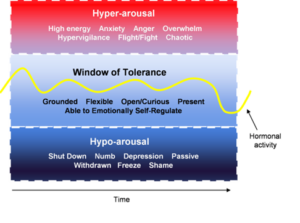In any workplace, leaders play a crucial role in managing teams, fostering a productive environment,…

What is your Conflict Tolerance Window?
Conflict Tolerance is a new term I’ve come across and instantly became curious about. I’ve noticed through my conflict resolution career that everyone has a different tolerance when it comes to stepping in to address conflict. Some thrive on intense conversations and tend to attract conflict while others may withdraw quickly or remain silent. How might this impact ourselves, our team and our organization?
One of the definitions of tolerance is the capacity to endure continued subjection to something, such as an environmental condition, without adverse reaction. Conflict tolerance is related to previous conflict experiences and how they might affect our response to present conflicts. If we’ve had positive past experiences with conflict we likely have a higher tolerance to step into conversations that explore differing opinions. If we had negative experiences or are in a state of stress or trauma we may not be as successful. This may look like strong intensity/hyper-arousal or avoidance/hypo-arousal as sho wn in the chart here.
wn in the chart here.
Psychologists have worked with the Window of Tolerance theory to help their clients address many different situations. I find that it also applies to our ability to manage conflict successfully. Awareness is the key. Be aware or your own window of Tolerance and others. Many of your colleagues may have a smaller window of tolerance than yourself and think about how you can create a safe space for others to enter into a difficult conversation. Or for those who are easy to arouse think about what is needed to ensure the energy level remains manageable.
How can we increase our own conflict tolerance?
- Mindfulness, staying present, using grounding exercises
- Recognizing limiting beliefs about conflict
- Learning more about conflict by reading or taking courses
- Find a conflict coaching expert to work with and dig deeper
- Practicing with addressing conflict when situations are not high risk. Make a list of situations and individuals with whom you avoid conflict or are always in conflict. Starting with the least difficult script out what you want to say and practicing delivery with someone you trust.
- Normalize conflict by addressing it afterwards. Sarah, I know we had a difficult conversation yesterday. I want you to know that I appreciate your ideas and I’m eager to continue to explore this matter so we can find a solution that meets both our needs.
Strengthening your conflict tolerance or widening your window of tolerance takes time and effort, but the results are well worth it. The better you are at managing conflict, the more you can encourage yourself and others to present, evaluate, and refine ideas to arrive at the best solutions to your or your teams’ most pressing problems.
“World peace, like community peace, does not require that each man love his neighbor – it requires only that they live together with mutual tolerance, submitting their disputes to a just and peaceful settlement.” – John F. Kennedy
Do you need more support in increasing your Conflict Tolerance. We can help through Training or Coaching




